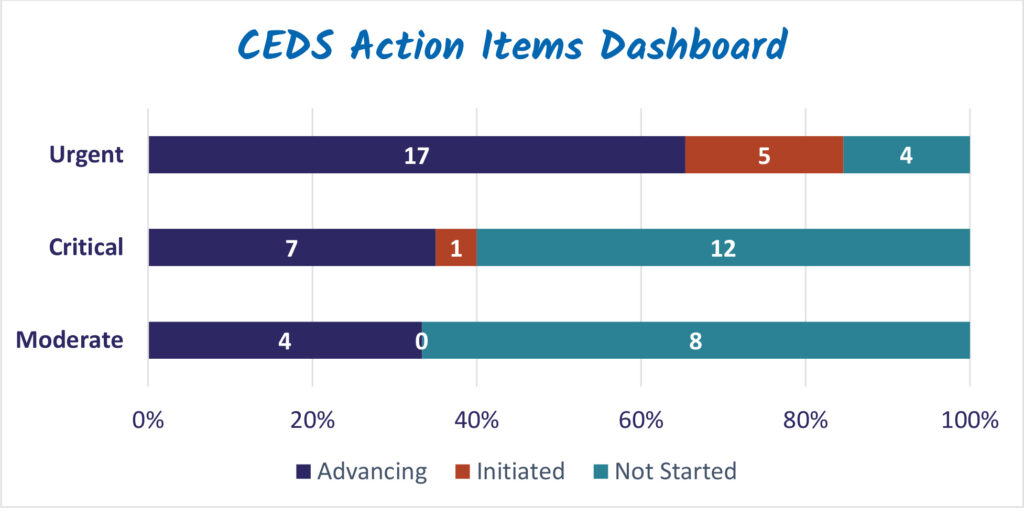Empowering the Future of Textiles: Centralina EDD Board Meeting at Gaston College
The Centralina Economic Development District (EDD) had the privilege of holding its summer board meeting at Gaston College’s Kimbrell Campus, specifically at the Textile Technology Center.
This visit provided an invaluable opportunity to explore the enduring significance of the textile industry in our region and its ongoing contributions to economic development and innovation.
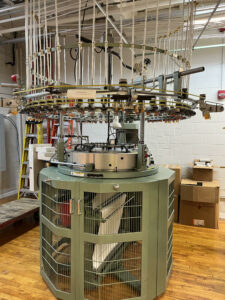
Manufactured in Union County, NC, this Circular Knitting Machine serves its purpose to create tubular fabrics in a continuous loop for small knitted products like t-shirts.
Key Takeaways
- The Textile Technology Center offers extensive activities and training programs, focusing on product development and specialized testing laboratories.
- The Fiber Innovation Center is set to become a central hub for advancing fiber technology and driving innovation within the textile sector.
- The importance of strategic partnerships and collaboration is essential for regional workforce development.
Supporting Innovation and Workforce Development: Gaston College’s Fiber Innovation Center
The Centralina EDD has demonstrated its commitment to regional economic growth by supporting Gaston College in securing a significant grant from the U.S. Economic Development Administration (EDA). In 2023, Gaston College was awarded $1.1 million to purchase advanced manufacturing equipment. This funding will bolster the capabilities of existing textile and apparel firms, enhance the talent pipeline, and foster entrepreneurial opportunities at the Fiber Innovation Center.
Strengthening the Textile Industry through Advanced Education and Training
Jasmine Wade-Cox, Executive Director of the Textile Technology Center at Gaston College, presented a detailed overview of the center’s extensive activities and training programs during a recent board meeting. The center focuses on four key product development areas and operates three specialized testing laboratories. These facilities are pivotal in driving innovation and ensuring the production of high-performance, sustainable materials.
Gaston College offers three comprehensive textile education pathways designed to equip students with the necessary skills and knowledge to excel in the textile industry. Additionally, the center provides customized training programs tailored for incumbent workers, ensuring that the current workforce remains well-prepared and able to meet industry demands. These educational initiatives are crucial for maintaining a robust and skilled workforce capable of sustaining the region’s textile industry.
The Fiber Innovation Center: A Hub for Technological Advancements
The Fiber Innovation Center is poised to become a central hub for advancing fiber technology and driving innovation within the textile sector. This state-of-the-art facility will support the development of high-performance, sustainable materials with applications spanning from household to industrial products. By promoting cutting-edge research and development, the center will play a crucial role in maintaining the global competitiveness of the textile industry in the Carolinas and abroad.
Insights from the Tour of Harney Hall and the Fiber Innovation Center
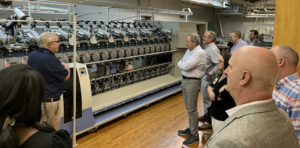
Don Rusch, Director of the Textile Technology Center provides an overview of this Vortex Spinning Machine which uses air to spin yarn.
Board members had the opportunity to tour Harney Hall and the newly established Fiber Innovation Center, gaining firsthand insight into the complex process of transforming fibers into yarn and fabric. The tour provided a comprehensive view of the diverse applications of these fabrics, which include clothing, household items, fire protection, and industrial uses. This engaging experience highlighted the intricate and innovative processes involved in textile production.
Fostering Regional Workforce Development through Collaboration
During a working lunch, board members engaged in a lively discussion on regional workforce development with Ms. Wade-Cox. They explored various aspects of the Textile Technology Center’s operations, including current enrollment numbers, the nature of partnerships with industry collaborators, and the specific employers leveraging the center’s resources and training programs. This interactive session underscored the center’s significant impact on workforce development and the importance of strategic partnerships in driving success.
Conclusion
The support from Centralina EDD and the awarded EDA grant marks a significant milestone for Gaston College and the regional textile industry. With the advanced manufacturing equipment funded by this grant, the Fiber Innovation Center is well-positioned to lead advancements in fiber technology, support existing firms, and create new entrepreneurial opportunities. Through comprehensive education pathways and customized training programs, Gaston College is ensuring a well-prepared and skilled workforce that will continue to drive the textile industry forward. The collaborative efforts and strategic partnerships fostered by the Textile Technology Center are essential in achieving sustained economic growth and innovation in the region.
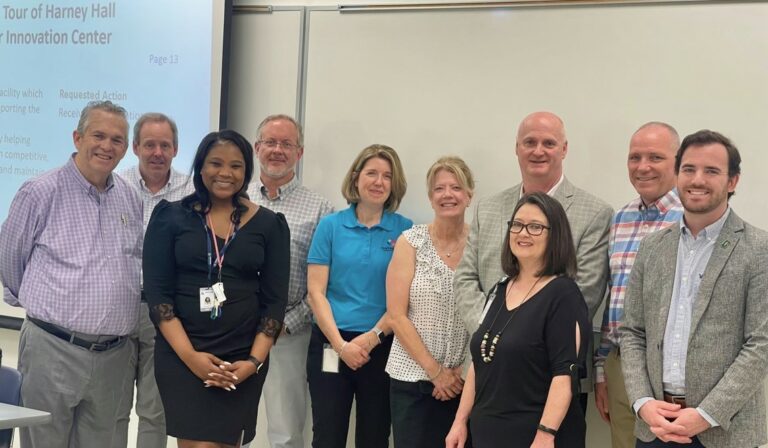
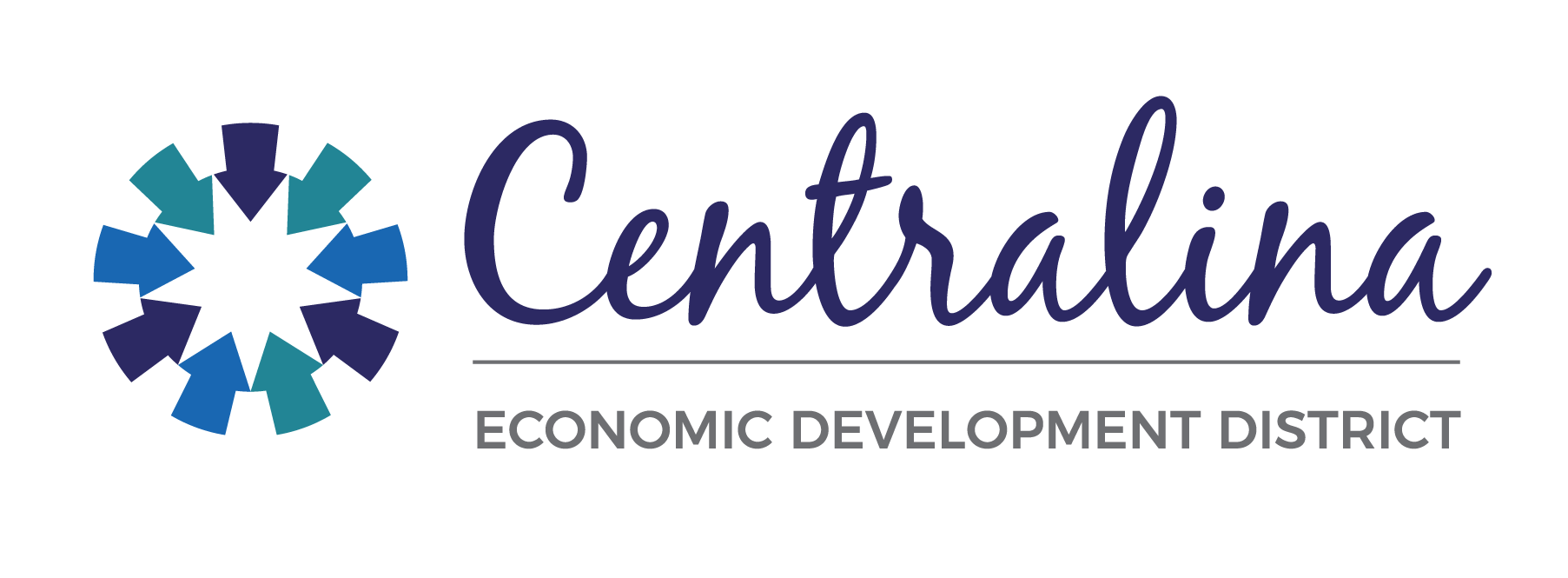




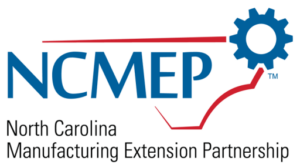 Effective supply chain management is crucial in today’s ever-changing business environment for achieving sustainable growth and gaining a competitive edge. The
Effective supply chain management is crucial in today’s ever-changing business environment for achieving sustainable growth and gaining a competitive edge. The


